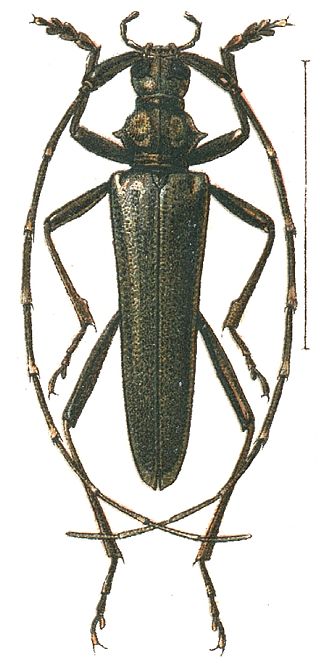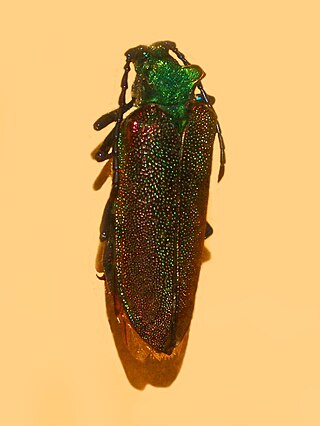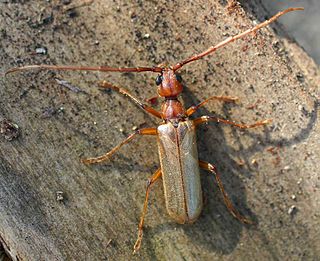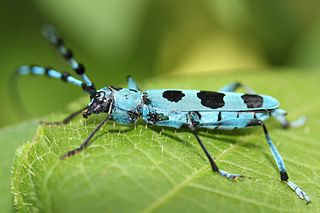Related Research Articles

The longhorn beetles (Cerambycidae), also known as long-horned or longicorns, are a large family of beetles, with over 35,000 species described. Most species are characterized by extremely long antennae, which are often as long as or longer than the beetle's body. In various members of the family, however, the antennae are quite short and such species can be difficult to distinguish from related beetle families such as the Chrysomelidae. The scientific name of this beetle family goes back to a figure from Greek mythology: after an argument with nymphs, the shepherd Cerambus was transformed into a large beetle with horns.

Per Olof Christopher Aurivillius was a Swedish entomologist.

Lamiinae, commonly called flat-faced longhorns, are a subfamily of the longhorn beetle family (Cerambycidae). The subfamily includes over 750 genera, rivaled in diversity within the family only by the subfamily Cerambycinae.

The Disteniidae are a small family of beetles in the superfamily Chrysomeloidea, traditionally treated as a group within the Cerambycidae.

The Oxypeltidae are a small family belonging to the superfamily Chrysomeloidea, widespread in the Andean region of Chile and Argentina. They have traditionally been considered a group within the Cerambycidae.

The Vesperidae are a small family of beetles, normally classified within the family Cerambycidae, of heterogeneous aspect but all characterised by larval stages related to roots of herbaceous plants or trees

Stephan von Breuning was an Austrian entomologist who specialised in the study of beetles (coleopterology), particularly within the longhorn family (Cerambycidae).

Acanthoderini is a tribe of longhorn beetles of the subfamily Lamiinae. It was described by Thomson in 1860.

Callidiini is a tribe of beetles in the subfamily Cerambycinae, containing the following genera:

Compsocerini is a tribe of beetles in the subfamily Cerambycinae, containing the following genera:

Eburiini is a tribe of beetles in the subfamily Cerambycinae, synonymous with the tribe Heteropsini Lacordaire, 1868, containing the following genera:
Heteropsini is a tribe of beetles in the subfamily Cerambycinae, synonymous with the tribe Eburiini Blanchard, 1845, containing the following genera:
Neoibidionini was a tribe of beetles in the subfamily Cerambycinae, but now normally placed in the Ibidionini.

Trachyderini is a tribe of long-horned beetles in the family Cerambycidae. There are at least 140 genera and 650 described species in Trachyderini.
Lepturgantes is a genus of beetles in the family Cerambycidae, containing the following species:

Colobotheini is a tribe of longhorn beetles of the subfamily Lamiinae.

Hemilophini is a tribe of longhorn beetles of the subfamily Lamiinae.

Mesosini is a tribe of longhorn beetles of the subfamily Lamiinae.

Parmenini is a tribe of longhorn beetles of the subfamily Lamiinae.
Dmytro Zajciw was a Ukrainian and Brazilian entomologist, notable for his collection and for his many beetle discoveries. He was born in Velyka Mykhailivka, Ukraine and died in Rio de Janeiro, Brazil. He was the author of Two new genera and species of neotropical Longhorn beetles , 1957, Contribution to the study of Longhorn beetles of Rio de Janeiro , 1958, and was the first to describe the genera Adesmoides and Pseudogrammopsis, as well as the species Beraba angusticollis and Mionochroma subaurosum, among many others.
References
- ↑ Bezark, Larry G. A Photographic Catalog of the Cerambycidae of the World Archived 2013-08-27 at the Wayback Machine . Retrieved on 22 May 2012.
- ↑ Cope, Jim (1984). "Notes on the Ecology of Western Cerambycidae". The Coleopterists Bulletin. 38 (1): 27–36. ISSN 0010-065X.